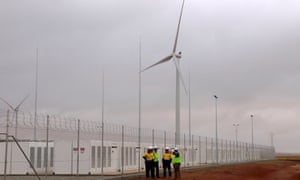Extract from The Guardian
World’s largest lithium battery cost $90.6m but revenue is healthy,
according to documents filed by French renewable company Neoen
The Tesla lithium-ion battery in South Australia is on track to make back a third of its construction costs in its first year of operation, new financial documents show.
The 100MW/129MWh battery was switched on in November and is paired with the Hornsdale windfarm, about 230km north of Adelaide.
The French renewable energy company Neoen, which owns the battery, filed for IPO listing on the French stock exchange this month.
A 400-page document filed in support of the application shows the battery, which is the largest lithium-ion battery in the world, had a capital cost of €56m or A$90.6m and generated €8.1m, or A$13.1m, in revenue from network services in the six months to 30 June 2018.
Almost $2m of that was from its 10-year contract with the SA government to provide reserve capacity for the state’s electricity network, which is worth $4m a year.
The rest was from trading on the frequency and ancillary services market.
It also made €6.7m, or A$10.8, from the sale of stored electricity.
The document does not state the project’s profit margins.
The SA government contract is for 70MW of capacity and a small amount of storage, leaving 30MW and the bulk of the battery’s storage capacity available to sell on the national energy market.
Dylan McConnell, from the Australian-German Climate and Energy College, said the financial returns were above the already high expectations for the project, but as more battery projects came online the rate of revenue growth could be expected to slow.
“There’s a finite need for these ancillary services,” he said. “They are very important resources but it’s quite a small market in the scheme of things.”
Neoen has several storage projects under way, including a 20MW battery attached to the proposed 194MW windfarm at the Bulgana green power hub in Victoria, 90% of which is contracted to the Victorian government.
It is also proposing a 50MW storage facility in Kaban, in Queensland.
The company said its success in partnering with Tesla to deliver the Hornsdale battery within 100 days of the contracts being signed – a promise made by Tesla founder and chief executive, Elon Musk, in a twitter exchange in March 2017 – had helped it win other contracts.
Australia is the largest market in terms of megawatt storage for the €2bn (A$3.2bn) company, which is attempting to raise €450m (A$728.3m) in capital through its IPO offer to increase its capacity from 2GW to 5GW.
The 100MW/129MWh battery was switched on in November and is paired with the Hornsdale windfarm, about 230km north of Adelaide.
The French renewable energy company Neoen, which owns the battery, filed for IPO listing on the French stock exchange this month.
A 400-page document filed in support of the application shows the battery, which is the largest lithium-ion battery in the world, had a capital cost of €56m or A$90.6m and generated €8.1m, or A$13.1m, in revenue from network services in the six months to 30 June 2018.
Almost $2m of that was from its 10-year contract with the SA government to provide reserve capacity for the state’s electricity network, which is worth $4m a year.
The rest was from trading on the frequency and ancillary services market.
It also made €6.7m, or A$10.8, from the sale of stored electricity.
The document does not state the project’s profit margins.
The SA government contract is for 70MW of capacity and a small amount of storage, leaving 30MW and the bulk of the battery’s storage capacity available to sell on the national energy market.
Dylan McConnell, from the Australian-German Climate and Energy College, said the financial returns were above the already high expectations for the project, but as more battery projects came online the rate of revenue growth could be expected to slow.
“There’s a finite need for these ancillary services,” he said. “They are very important resources but it’s quite a small market in the scheme of things.”
Neoen has several storage projects under way, including a 20MW battery attached to the proposed 194MW windfarm at the Bulgana green power hub in Victoria, 90% of which is contracted to the Victorian government.
It is also proposing a 50MW storage facility in Kaban, in Queensland.
The company said its success in partnering with Tesla to deliver the Hornsdale battery within 100 days of the contracts being signed – a promise made by Tesla founder and chief executive, Elon Musk, in a twitter exchange in March 2017 – had helped it win other contracts.
Australia is the largest market in terms of megawatt storage for the €2bn (A$3.2bn) company, which is attempting to raise €450m (A$728.3m) in capital through its IPO offer to increase its capacity from 2GW to 5GW.

No comments:
Post a Comment